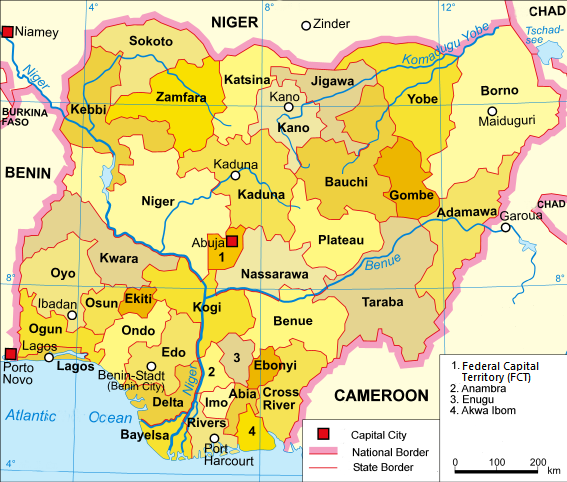Everyday I see new reports of ritual killings in Nigeria – locally called ‘money rituals’ – and although I haven’t stopped presenting these articles here, on this site, I have been forced to limit reporting on these barbaric and cruel crimes due to their overwhelming number. Unfortunately, there are many more African countries where ambitious, unscrupulous and criminal people commit the same repulsive crimes and governments fail to act effectively, as is the case in Nigeria.
Nevertheless the foregoing, I wish to draw the readers’ attention to the article below, a Nigerian plea to address the escalating wave of ritual killings terrorizing Africa’s most populated country, divided in 36 states.
Let the article speak for itself. The reader may find useful background reading in my February 13 2022 posting whereas I also wish to remind the reader that on February 9 of this year, the House of Representatives asked the Federal Government to declare state of emergency on ritual killings, signaling the urgency and spread of the problem.
(webmaster FVDK)
Addressing the escalating ritual killings challenge

Published: July 25, 2022
By: Business hallmark – Hallmark News
From all available indications, the killing of humans in Nigeria for ritual purposes is escalating. And it has to be severely addressed.
In some of the more confounding instances, the alleged perpetrators are most shockingly, young people.
An obvious trigger for the disreputable behaviour from many accounts is the parlous economic state of the nation. With inflation, unemployment and the exchange rate posting very dismal statistics, millions of Nigerians are at their wits end as to how to make ends meet. And some are being lulled into the false trap of ritual killings.
Compounding the extant challenges that the average Nigerian is faced with today are the atrocious governance failings countrywide, the unbridled rate of urbanisation and the collapse of both the traditional community structure and family values.
Some others would add factors like the parlous state of public education and very importantly, the untoward practices of several disreputable traditional and religious leaders who hardly inspire a better orientation for the embattled and impressionable in the society at a moment like this.
Indeed, given the reported close synergy between ritual killing practices and traditional and spiritual related observances and leaders, this is one critical area where the searchlight must be beamed as we seek a resolution of the menace. Traditional and spiritual leaders must be put on the spot.
This is more so when the entire ritual industry complex is predicated on traditional and religious factors. Within this framework, the thinking is that when the traditional ‘medicine man’ administers an appropriate mix of fitting incantations and sacrifices, the end result is that a mystical power transfer of sorts can then be effected in which the human sacrifice is then accepted by the superintending spiritual forces who then sign off on the efficacy and acceptability of the sacrifice and thereafter dispense the requested security, material or other similarly incredulous favours to the beneficiaries.
Alarmed by the rising incidence of the nefarious practice, the Federal House of Representatives had in February this year tasked the executive ‘to declare a state of emergency on the rising incidence.’ This was via a motion that was sponsored by its Deputy Minority Leader Toby Okechukwu.
In the same breath, the lawmakers requested Inspector General of Police, Usman Alkali Baba, to “take urgent steps to increase surveillance and intelligence gathering with a view to apprehending and prosecuting all perpetrators of ritual killings in Nigeria.”
And establishing a cultural nexus to the challenge, the lawmakers equally urged that the National Orientation Agency (NOA) “initiate a campaign towards changing the situation in the country.”
Five months after these resolutions were seemingly passed and carried, there is no let in the rate of incidence as regards the killing for rituals challenge.
Underscoring the depth of the challenge is the fact that pontificating political actors are not innocent of the practice. Indeed, some are minded to believe that they are indeed the prime enablers of the gory ring of shame.
Now and again, the airwaves are littered with news reports and revelations linking political players with acts of ritual. Whether in the Okija shrine incidents earlier in the current democratic disposition where a then serving governor openly confessed to having been taken to a shrine to swear an oath of allegiance to a godfather; or in the Otokoto saga that wracked the Imo State capital, Owerri; or even the Baddoo incidents in Ikorodu, Lagos State, political players have been implicated now and again.
Beyond the immediate precincts of politics is the fact that many of our supposed elite role models also get to be fingered from time to time as being somewhat involved in the ring. At the moment for example, a very notable and high profile tertiary education complex proprietor is being tried on account of the mysterious death of a lodger in his hotel premises.
With clearly both the high and mighty being implicated in the challenge and with many members of the public increasingly being led to believe that you really cannot make good progress in today’s Nigeria without getting involved with shady and nefarious underground groups that are associated with ritual killings and related vices, it is really a herculean task addressing the cankerworm.
An expanded part of the challenge is even more deeply historical. We refer to a time in the distant past when different communities were engaged in acts of war and where, it is believed that the prevalent spiritual environment back then tended to accommodate human ritual killings under certain communally defined conditions. While in the modern social environment this has since been formally outlawed, very clearly some rogue practitioners continue to find ways around its outlawing.
This situation has also not been helped by the continued prevalence of traditional and modernist cult groups that many a time have been widely believed to be associated with ritual killings. While one or more of such groups now and again comes out to the public domain to swear their non-involvement with ritual killings, the deeper fact remains that the tar on the entire sub-set remains. And then you have the yahoo yahoo plus segment of the irascible internet fraud ring.
In the view of the newspaper, what is needed is a firm will to act, to enforce the laws and vigorously drive a campaign to wean our people off the accursed path of ritual killing. And while we are at it, can our leaders all commit to simply going back to the basics and doing very simple things to raise the governance bar? Half of the crisis would be addressed in that way.

Click here for more postings on ritual murders in Ogun State
Source: Addressing the escalating ritual killings challenge

